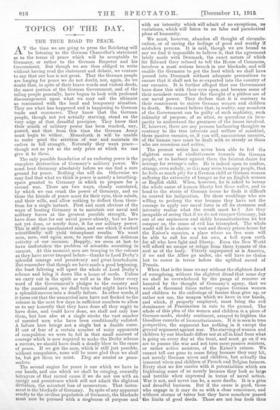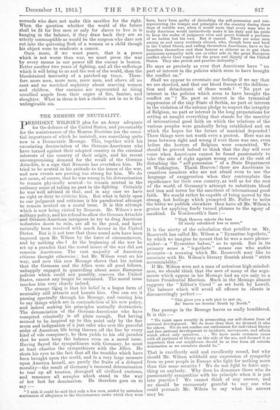TOPICS OF THE DAY.
THE TRUE ROAD TO PEACE.
AT the time we are going to press the Reichstag will be listening to the German Chancellor's statement as to the terms of peace which will be acceptable to Germany, or rather to the German Emperor and his Government. But though we are thus obliged to write without having read the statement and debate, we venture to say that our loss is not great. That the German people are longing for peace we do not doubt, nor, again, do we doubt that, in spite of their brave words and violent deeds, the saner portion of the German Government, and of the ruling people generally, have begun to look with profound discouragement upon what we may call the ultimate as contrasted with the local and temporary situation. They see what has happened and is happening to German trade and commerce. They know that the German people, though not yet actually starving, stand on the very edge of that dreadful precipice. They know that their zenith of military power has been reached, nay, passed, and that from this time the German Army must begin to wither. Henceforth it will be unable to make good the attrition of war and maintain its cadres in full strength. Naturally they want peace— though not as yet at the only price at which we can give it to them. The only possible foundation of an enduring peace is the complete destruction of Germany's military power. We must beat Germany absolutely before we can find a sure ground for peace. Nothing else will do. Otherwise we may find that what we think is peace is merely a breathing- space granted to Germany in which to prepare for a second war. There are two ways, closely correlated, by which we can crush the power of Germany, and on these the friends of peace must fix their eyes, their minds, and their wills, and allow nothing to deflect them there- from for a single instant. First and most obvious of the ways of beating Germany is to maintain our naval and military forces at the greatest possible strength. We have done that for our naval power already, but we have not yet done, or nearly done, it for our military power. This is still an unexhausted mine, and one which if worked scientifically will yield triumphant results. We want men, men, and again men' to meet the almost delirious activity of our enemies. Happily, we seem at last to have undertaken the problem of scientific recruiting in earnest. At this moment men are trooping to the colours as they have never trooped before—thanks to Lord Derby's splendid courage and persistency and great-heartedness. But remember that though we have made a good beginning, the least faltering will upset the whole of Lord Derby's scheme and bring it down like a house of cards. Unless we carry out in the spirit as well as in the letter every word of the Government's pledges to the country and to the married men, we shall turn what might have been a splendid success into a deadly failure. In other words, if it turns out that the unmarried men have not flocked to the colours in the next few days in sufficient numbers to allow us to say honestly that they have done all they ought to have done, and could have done, we shall not only lose them, but lose also at a single stroke the vast number of married men who have been conditionally enlisted. A failure here brings not a single but a double curse. If out of fear of a certain number of noisy opponents of compulsion we were to fail in that small amount of courage which is now required to make the Derby scheme a success, we should have dealt a deadly blow to the cause of peace. If we get the men, which is still just possible, without compulsion, none will be more glad than we shall be, but get them we must. They are wanted as peace- makers.
The second engine for peace is one which we have in our hands, and one which we shall be cringing, cowardly betrayers of that sacred cause if we do not use with an energy and persistence which will not admit the slightest deviation, the minutest loss of momentum. That instru- ment is the blockade of Germany. In spite of any apparent cruelty to the civilian population of Germany, the blockade must now be pursued with a singleness of purpose and with an intensity which will admit of no exceptions, no variations, which will listen to no false and paradoxical pleas of humanity.
We must, however, abandon all thought of circumlo- cution, or of saving the feelings of good and worthy if mistaken persons. It is said, though we are bound to say we find it impossible to believe it, that the agreement lately made with Denmark, the exact nature of which Sir Edward Grey refused to tell the House of Commons, involves a most serious breach in our blockade, and will enable the Germans to get the food which we shall have passed into Denmark without adequate precautions to ensure that it shall not be re-exported into the country of our enemies. It is further alleged that our Government have done this with their eyes open, and because some of their momleers cannot bear the thought of a pitiless use of our naval power. They declare that it is contrary to their consciences to starve German women and children to death. We cannot believe that, in reality, any members of the Government can be guilty of such sophistry, such infirmity of purpose, of so utter, so querulous an inca- pacity to understand the greatness of the issues involved. If, however, there are any persons harbouring thoughts so contrary to the true interests and welfare of mankind, these passive enemies, or, if you will, unconscious enemies, of the human race must be dealt with as sternly as those who are conscious and active.
The present writer has never been able to feel the slightest sense of vindictiveness towards the German people, or to harbour against them the faintest desire for revenge for revenge's sake. He is indeed open to confess, strange, even unholy, as this may seem to many people, that he feels as much pity for a German child or German woman suffering the extremity of hunger as for an English woman or English child. When, however, he is asked to betray the whole cause of human liberty lest these suffer, and to bend to the storm of German terror he finds it difficult to control his indignation. Do these weaklings who are willing to prolong the war because they have not the courage to apply our naval force in all its sternness and intensity realize what the result must be ? Are they incapable of seeing that if we do not conquer Germany, but out of our supineness and sickly humanitarianism let her conquer us, the cause of evil has triumphed. The whole world will be in chains—a vast and dreary prison-house for the Kaiser's enemies, a place where no free man will be able to call his soul his own, a hell upon earth for all who love light and liberty. Even the New World will afford no escape or refuge from these tyrants of the soul as of the body. Utterly unprepared as is America, if we and the Allies go under, she will have no choice but to cower in terror before the uplifted sword of Prussia.
When that is the issue we say without the slightest dread of wrongdoing, without the slightest dread that some day we shall be overwhelmed by the pangs of remorse or haunted by the thought of Germany's agony, that we would a thousand times rather expose German women and children to the sufferings of famine than give up, or rather not use, the weapon which we have in our hands, and which, if properly employed, must bring the evil dominance of Prussianism in ruin to the ground. The whole of this plea of the women and children is a piece of German-made, shoddy sentiment, arrayed to frighten the bloodless eunuchs of humanitarianism. If it is seen in true perspective, the argument has nothing in it except the general argument against war. The starving of women and children by our blockade differs not at all in kind from what is going on every day at the front, and must go on if we are to pursue the war and not turn mere passive resisters, or rather active assisters, of the Kaiser's crimes. We cannot tell our guns to cease firing because they may hit, not merely German wives and children, but actually the innocent wives and children of French and Belgian farmers. Every shot we fire carries with it potentialities which are frightening some of us mercy because they look so large and terrible when expressed in terms of naval action. War is not, and never can be, a mere duello. It is a grim and dreadful business. But if the cause is good, those who engage in it may do so with a clear conscience, and without storms of terror lest they have somehow passed the limits of good deeds. Those are not less fools than cowards who dare not make this sacrifice for the right. When the question whether the world of the future shall be fit for free men or only for slaves to live in is hanging in the balance, if they draw back they are as utterly contemptible as would be the surgeon who dare not cut into the quivering flesh of a woman or a child though his object were to eradicate a cancer.
Once more, if we want peace, that is a peace which is not worse than war, we must press the war by every means in our power till the enemy is beaten. Better another two years of fighting, and all the sufferings which it will bring to us and the rest of the world, than the bloodstained insecurity of a patched-up truce. There- fore more men, more men, more men, and: above all no cant and no wretched sophistry about starving women and children. Our enemies arc represented as rising unsullied angels from their orgies of fire, famine, and slaughter. What in them is but a choleric act in us is the unforgivable sin.



















































 Previous page
Previous page